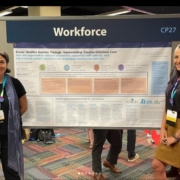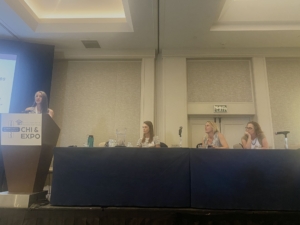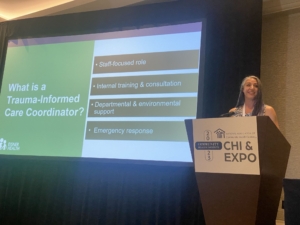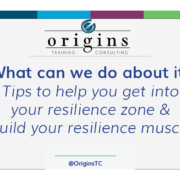The other day I was at the gym and someone asked me what I do for work. I really love what I do, but I have to admit that I sometimes dread this question and often try to avoid it. When I tell people about the work we do at Origins to support leaders implementing a trauma-informed approach, I tend to get one of two reactions. The first reaction–from people who are familiar with a trauma-informed approach–tends to be one of excitement. They immediately know what I am referring to and are super excited to talk about it. The second reaction usually involves a blank stare and some version of “what the heck is that?” And then I have to try and explain.
At Origins, we define a trauma-informed as an approach to organizational culture that recognizes how stress affects people, promotes tools and practices to decrease its impact, and encourages opportunities for safety and connection. We also like to say that this approach starts with each of us so that’s where the supporting leaders part comes into play. But what does all of this actually mean?
I think the simplest way to explain what a trauma-informed approach looks like in action is that stress affects how we show up. We lead differently when we are stressed, we communicate differently when we are stressed, we engage in conflict differently when we are stressed. A trauma-informed approach recognizes that how we react to potential stressors is impacted by our current circumstances and our life experiences. It also provides concrete tools for managing stress (spoiler alert: half the battle is realizing you are stressed so you can be accountable and able to do something about it). Simple idea, rarely easy.
After I explain that to the second group of people (we’ll call them the blank stare people), their reaction tends to be like “Huh, that makes a lot of sense. But trauma-informed is really an awful name for it.” I tend to agree.
Other terms have been used as well–trauma-sensitive, resilience-building, healing-centered, etc. But I have to be honest that I am really not a fan of any of them. We use these terms because that’s what people are often searching for (thanks SEO), but I think what I like least about all of them is that they really encourage us to think about this approach in terms of “us” versus “them”. We know from the original Adverse Childhood Experiences (ACE) study that ACEs are really common. We also know that the study only measured a subset of experiences at both the individual and community levels that can contribute to the development of toxic stress. And the impacts of COVID are layered on top of all of this.
It is not to say that certain individuals and certain communities have not experienced higher levels of stress than others. Indeed, that is absolutely the case. But participating in some version of the trauma olympics only perpetuates the idea that a trauma-informed approach only applies to “those people over there” and not to all of us as humans.
So what’s the alternative? Andi and I have spent more time talking about this question than is probably productive, but the term we keep coming back to is “humaning.” Humans experience stress. We adapt. We develop habits that are helpful in the moment but not down the line. We disconnect. This process is true for all of us. When we understand how this process works (for ourselves and others), we can connect with the humanity in all of us. We will continue to use the terms trauma-informed and resilience-building because that language has caught on and is meaningful. But we are also going to start integrating more human-oriented language. Because at its core, this approach is for humans and humans experience stress.
And please let us know if you have met a human who does not meet this criteria–we would love to meet them.
















